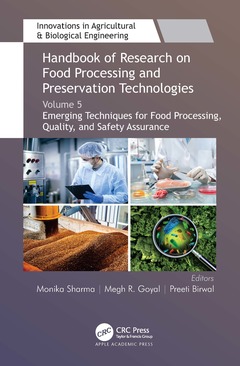Handbook of Research on Food Processing and Preservation Technologies Volume 5: Emerging Techniques for Food Processing, Quality, and Safety Assurance Innovations in Agricultural & Biological Engineering Series
Coordonnateurs : Sharma Monika, Goyal Megh R., Birwal Preeti

The Handbook of Research on Food Processing and Preservation Technologies covers a vast abundance of information on various design, development, and applications of novel and innovative strategies for food processing and preservation. The roles and applications of minimal processing techniques (such as ozone treatment, vacuum drying, osmotic dehydration, dense phase carbon dioxide treatment, pulsed electric field, and high-pressure assisted freezing) are discussed, along with a wide range of applications. The handbook also explores some exciting computer-aided techniques emerging in the food processing sector, such as robotics, radio frequency identification (RFID), three-dimensional food printing, artificial intelligence, etc. Some emphasis has also been given on nondestructive quality evaluation techniques (such as image processing, terahertz spectroscopy imaging technique, near infrared, Fourier transform infrared spectroscopy technique, etc.) for food quality and safety evaluation. The significant roles of food properties in the design of specific foods and edible films have been elucidated as well.
Volume 5: Emerging Techniques for Food Processing, Quality, and Safety Assurance discusses various emerging techniques for food preservation, formulation, and nondestructive quality evaluation techniques. Each chapter covers major aspects pertaining to principles, design, and applications of various food processing methods, such as low temperature-based-ultrasonic drying of foods, hypobaric processing of foods, viability of high-pressure technology, application of pulsed electric fields in food preservation, green nanotechnology for food processing and preservation, advanced methods of encapsulation, basics and methods of food authentication, imaging techniques for quality inspection of spices and nuts, FTIR coupled with chemometrics for food quality and safety, and the use of robotic engineering for quality and safety.
Other volumes in the 5-volume set include:
Volume 1: Nonthermal and Innovative Food Processing Methods
Volume 2: Nonthermal Food Preservation and Novel Processing Strategies
Volume 3: Computer-Aided Food Processing and Quality Evaluation Techniques
Volume 4: Design and Development of Specific Foods, Packaging Systems, and Food Safety
Together with the other volumes in the set, the Handbook of Research on Food Processing and Preservation Technologies will be a valuable resource for researchers, scientists, students, growers, traders, processors, industries, and others.
1. Low Temperature Based Ultrasonic Drying of Foods 2. Hypobaric Processing of Food 3. Viability of High-Pressure Technology in the Food Industry 4. Potential of Pulsed Electric Fields in Food Preservation 5. Pulsed Light Technology in Food Processing and Preservation 6. Potential of Green Nanotechnology in Food Processing and Preservation 7. Food Encapsulation: Principles, Novel Methods, and Applications 8. Food Authentication: Basics and Detection Methods 9. Imaging Techniques for Quality Assessment of Spices and Nuts 10. Fourier Transform Infrared (FTIR) Spectroscopy with Chemometrics: Evaluation of Food Quality and Safety 11. Robotic Engineering: A Tool for Quality and Safety of Foods
Monika Sharma, PhD, is working as a Scientist in the Dairy Technology Division at the Southern Regional Station of the ICAR–National Dairy Research Institute, Bengaluru, India, and is actively involved in teaching and research activities. She was formerly a scientist at ICAR—Central Institute of Postharvest Engineering & Technology, Ludhiana, Punjab, for more than five years. Dr. Sharma has more than ten years of research experience. She has worked in the area of convenience and ready-to-eat foods, functional foods, quality evaluation, composite dairy foods, starch modification and its application in dairy food products, etc. Presently, she is working in the area of functional and indigenous dairy foods. She has published several research papers in peer-reviewed journals, edited books, technical bulletins, technology inventory books, book chapters, popular articles, and more than 20 conference papers. She has successfully guided six postgraduate students for their dissertation work. She has worked as a principal investigator of several research projects and has developed various technologies, for which she has also conducted entrepreneurship development programs. She has earned several awards, such as an ICAR–JRF award and fellowship, first rank in all India level Agricultural Research Services examination in the discipline of Food Science & Technology ICAR–NET, conference awards, institute awards, etc. She is a life member of the Indian Science Congress and the Association of Food Scientists and Technologists (India). She received a degree in Food Science & Technology from Delhi University, New Delhi; an MSc in Food Technology from Govind Ballabh Pant University of Agriculture and Technology, Pantnagar; and a PhD in Dairy Technology from ICAR–National Dairy Research Institute (NDRI), Karnal, Haryana, India.
Megh R. Goyal, PhD, PE, is a Retired Professor in Agricultural and Biomedical Engineering from the General Engineering De
Date de parution : 11-2021
15.6x23.4 cm
Disponible chez l'éditeur (délai d'approvisionnement : 14 jours).
Prix indicatif 171,15 €
Ajouter au panierThèmes de Handbook of Research on Food Processing and Preservation... :
Mots-clés :
Pulsed Electric Fields; Moisture Content; PEF Treatment; PEF Processing; Hyper-spectral Imaging; Ultrasound Pre-treatment; PLT; Food Frauds; Pulsed Light Treatment; HPP Treatment; Hyperspectral Imaging; Sous Vide; Ultrasound Pretreatment; HPP Technology; Sous Vide Cooking; AFLP Analysis; Food Authentication; Pure Convective Drying; Airborne Ultrasound; THz Imaging; Convective Drying; Delivery Systems; HPP; Hyperspectral Imaging Technique; Ultrasound Application



